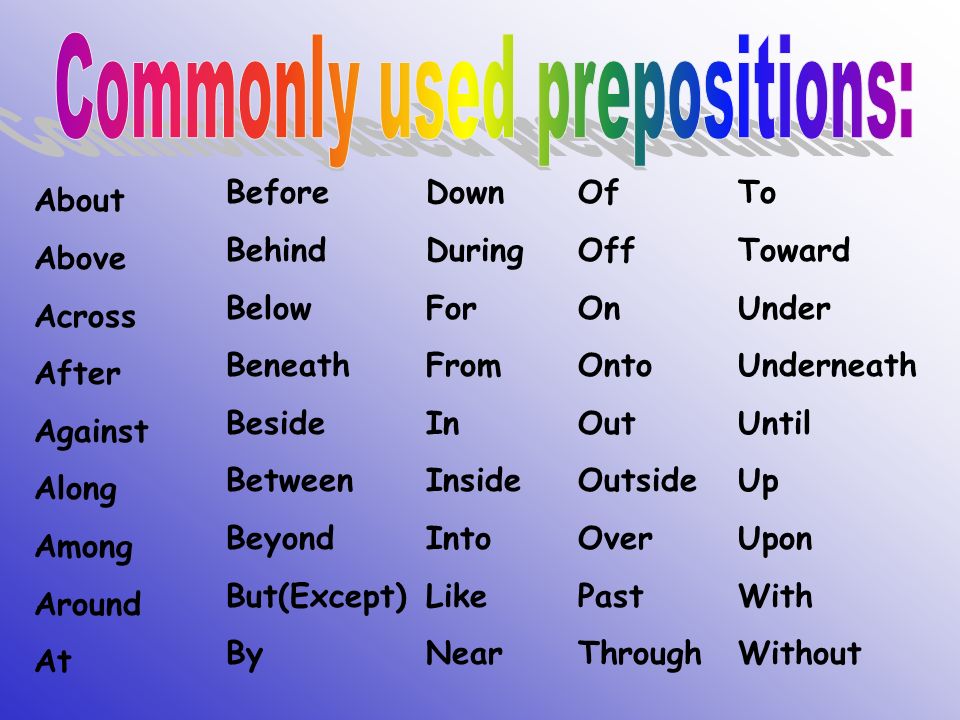Preposition is a word or several words that express place, time, reason and other logical relationships between different parts of the sentence.
There are over 100 prepositions in English. The most common single-word prepositions are:



Although most prepositions are single words, some pairs and groups of words operate like single prepositions:
- They were unable to attend because of the bad weather in Ireland.
- Jack’ll be playing in the team in place of me.
Prepositions are always followed by a noun or a pronoun (or sometimes a gerund).
- I’ll meet you in the cafe opposite the cinema.
- It was difficult to sleep during the flight.
- Give that to me.
- They were talking about their trip.
Types of prepositions
Prepositions show the relationship between the noun or pronoun and other words in a sentence. For example, they describe the position of something, the time when something happens, the way in which something is done, etc.
Prepositions of movement
Prepositions of movement are used to show the direction somebody or something is moving to, towards, from, out of, etc.
- We walked across the park.
- The cat jumped out of the box.
- I took the picture off the wall.
- The price of food has gone up in the past two years.
- The boy is running away from me.
Prepositions of place
Prepositions of place are used to say where someone or something is.
- The ball is on the box.
- The ball is between the box and the bear.
- The ball is behind the box.
- The ball is in front of the box.
- The ball is under the box.
- The ball is next to the box.
- The ball is in the box.
- The ball is near the box.
Prepositions of time
Prepositions of time tell us when something happens, and for how long. They are usually used with clock times, mealtimes, parts of the day, months, years, and other durations.
For example:
– at night
– at 9.00 / 10.30 / 7.45
– at the weekend
etc.
- I start work at 9.00 every day.
- He doesn’t usually go out at night.
- She sometimes works at the weekend.
– on Monday
– on Friday afternoon, on Saturday night
– on the 20th of January,
etc.
- I’m meeting Tom on Monday.
- I don’t usually work on Friday afternoon.
- My birthday is on November 27th.
– in the morning / the afternoon / the evening
– in July / September / January
– in winter / spring / summer / autumn
etc.
- He usually watches TV in the evening.
- They sometimes go on holiday in July.
- We bought this house in 2012.
- It’s always cold here in winter.
| BUT: – We always exchange presents at Christmas. – We always exchange presents on Christmas Day. – He likes going out at New Year. – He likes going out on New Year’s Eve. |
Prepositions and abstract meanings
Common prepositions that show relationships of space often have abstract as well as concrete meanings.
Compare:
- There were beautiful mountains beyond the hotel.
- Learning Japanese in a year was beyond them all. (beyond = too difficult for)
Some common prepositions such as ‘at’, ‘in’ and ‘on’ can have abstract meanings:
- I think you will both need to discuss the problem in private.
- All three singers were dressed in black.
- Our dog stays on guard all night, even when he’s sleeping!
Adjectives with prepositions
These are some useful combinations of adjectives and prepositions we should remeber:
- I’m interested in cooking.
- He’s very good at playing tennis.
- Carrots are good for you.
- My sister is afraid of spiders.
- Paris is famous for the Eiffel Tower.
- We’re worried about the English test.
Prepositions at the end of a sentence
There’s a popular myth in English that you may not end a sentence with a preposition. However, we sometimes do separate a preposition from the words which follow it. It is common in informal styles.
- She was someone to whom he could talk. (formal)
- She was someone who he could talk to. (informal)
- Which room are they having breakfast in? (informal)
- In which room are they having breakfast? (formal)
Consider the following examples:
- Where did you come from? (NOT:
From where did you come?) - That is something I cannot agree with.
- How many of you can I depend on?
Without these prepositions the meaning would not be clear.
But if the meaning is clear without the preposition, just do not use it.
- Incorrect:
Where is your brother at? - Correct: Where is your brother?
In this video from 7ESL, you’ll find many useful phrases with prepositions to improve your vocabulary:
Read more about prepositions: